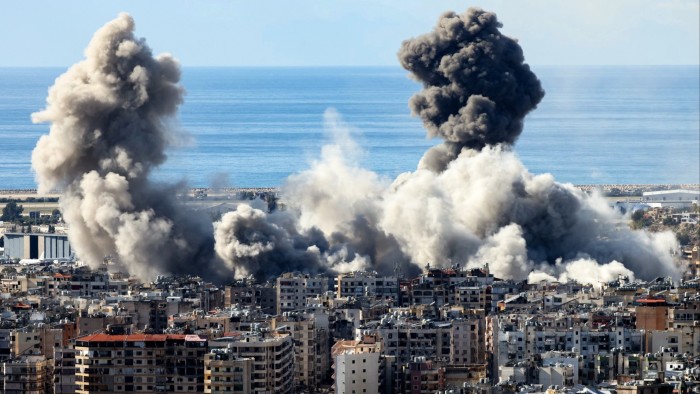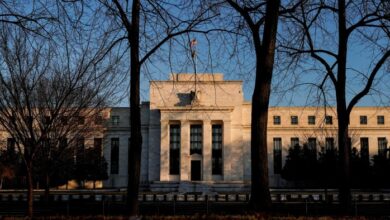A ceasefire was reached in the Israel-Lebanon war

President Joe Biden said Tuesday that Israeli and Lebanese leaders have accepted a US-brokered ceasefire agreement, raising hopes of an end to year-long hostilities between Israeli forces and Hizbollah .
Speaking from the White House, Biden said the agreement would take effect at 4 a.m. local time in Lebanon on Wednesday.
Israel’s security cabinet voted to approve the plan on Tuesday night and it must also be approved by Lebanon’s interim government.
“According to the agreement reached today. . . The fighting across the Lebanon-Israel border will end,” Mr. Biden said. “This is designed to permanently end hostilities.”
Under the terms of the agreement, the Israel Defense Forces will gradually withdraw from Lebanon over a period of 60 days and be replaced by the Lebanese army.
Hizbollah, the Lebanese militant group, will be banned from rebuilding infrastructure in the country’s southern regions.
The Iran-backed group’s fighters plan to move mainly north of the Litani River, which runs up to 30km from the Israel-Lebanon border.
According to those involved in the negotiations, Hizbollah has accepted the ceasefire agreement.
Mr. Biden said the US and France would work with Israel and Lebanon to see the agreement fully implemented, adding that no US troops would be deployed in southern Lebanon.
French President Emmanuel Macron said “France will make every effort to support the implementation of this agreement,” which “will open a new page for Lebanon.”
Israeli Prime Minister Benjamin Netanyahu said earlier on Tuesday night that Israel is ready to implement the agreement, but “the duration of the ceasefire depends on what happens in Lebanon.”
He also insisted he had reached a “full understanding” with the US that Israel would maintain “full freedom of military action” in the event Hizbollah violated the agreement.
“If Hizbollah violates the agreement and tries to arm itself – we will attack,” Netanyahu said.
“If they try to rebuild terrorist infrastructure near the border – we will attack. If it launches missiles, if it digs tunnels, if it brings missile trucks – we will attack.”
As Netanyahu spoke, the Israeli military launched heavy airstrikes across Lebanon, including several neighborhoods in central Beirut previously unaffected by the conflict, causing panic. new in the Lebanese capital.
Diplomats hope the deal will pave the way for an end to one of the bloodiest rounds of fighting in decades of conflict between Israel and Hizbollah.
Biden’s team briefed President-elect Donald Trump’s national security team on the terms of the deal in recent days.
Trump’s national security adviser, Mike Waltz, welcomed the agreement, saying on X: “I’m pleased to see concrete steps to de-escalate the Middle East.”
Waltz added Iran is “the root cause of chaos and terrorism” in the Middle East and said the Trump administration “will not accept their status quo of supporting terrorism.”
The latest hostilities between Israeli forces and Hizbollah erupted last year when the group began firing rockets into Israel in a show of solidarity with Hamas, following the deadly Oct. 7 attack on the Jewish state .
Israel responded to massacres by Palestinian militant groups in the country’s southern regions and hostage-taking by invading Gaza, leading to devastation in much of the coastal enclave.
The fighting between Israel and Hizbollah has since killed more than 3,700 Lebanese and more than 140 Israelis, as well as forced people on both sides of the border to flee their homes. More than 1 million Lebanese and about 60,000 Israelis have been displaced.
For much of the past year, fighting between Hizbollah and Israel was largely limited to gun battles on a narrow strip of land on either side of the Green Line, the United Nations-demarcated border between the two countries.
But in recent months it has escalated into a full-blown war, with Israel carrying out heavy bombardment of targets across Lebanon before launching a ground invasion in October.
The attack dealt a series of devastating blows to Hizbollah, killing the group’s longtime leader Hassan Nasrallah, while damaging large amounts of weapons and infrastructure and destroying large areas of land. large in the east and south of the country.
Hizbollah and its patron Iran said for much of last year that they would not agree to a ceasefire if the war in Gaza did not end.
But Hizbollah has since changed its position and Israel’s offensive in Gaza continues.
Biden said his administration would pursue efforts to revive talks between Türkiye, Egypt, Qatar and Israel on a ceasefire in Gaza.
He added that the normalization of relations between Israel and Saudi Arabia and the establishment of a Palestinian state “are still possible.” Doing so “will require making some difficult choices,” he said.
“Now Israel must be bold in translating its tactical gains against Iran and its proxies into a coherent strategy that ensures Israel’s long-term security and promotes peace and prosperity. more widely in the region,” Mr. Biden said.
Mr. Macron said France would pursue efforts to end hostilities in Gaza and ensure the release of the hostages, stressing the “unprecedented suffering of the people of Gaza.”
Additional reporting by Leila Abboud in Paris; Cleve Jones’s map of London





